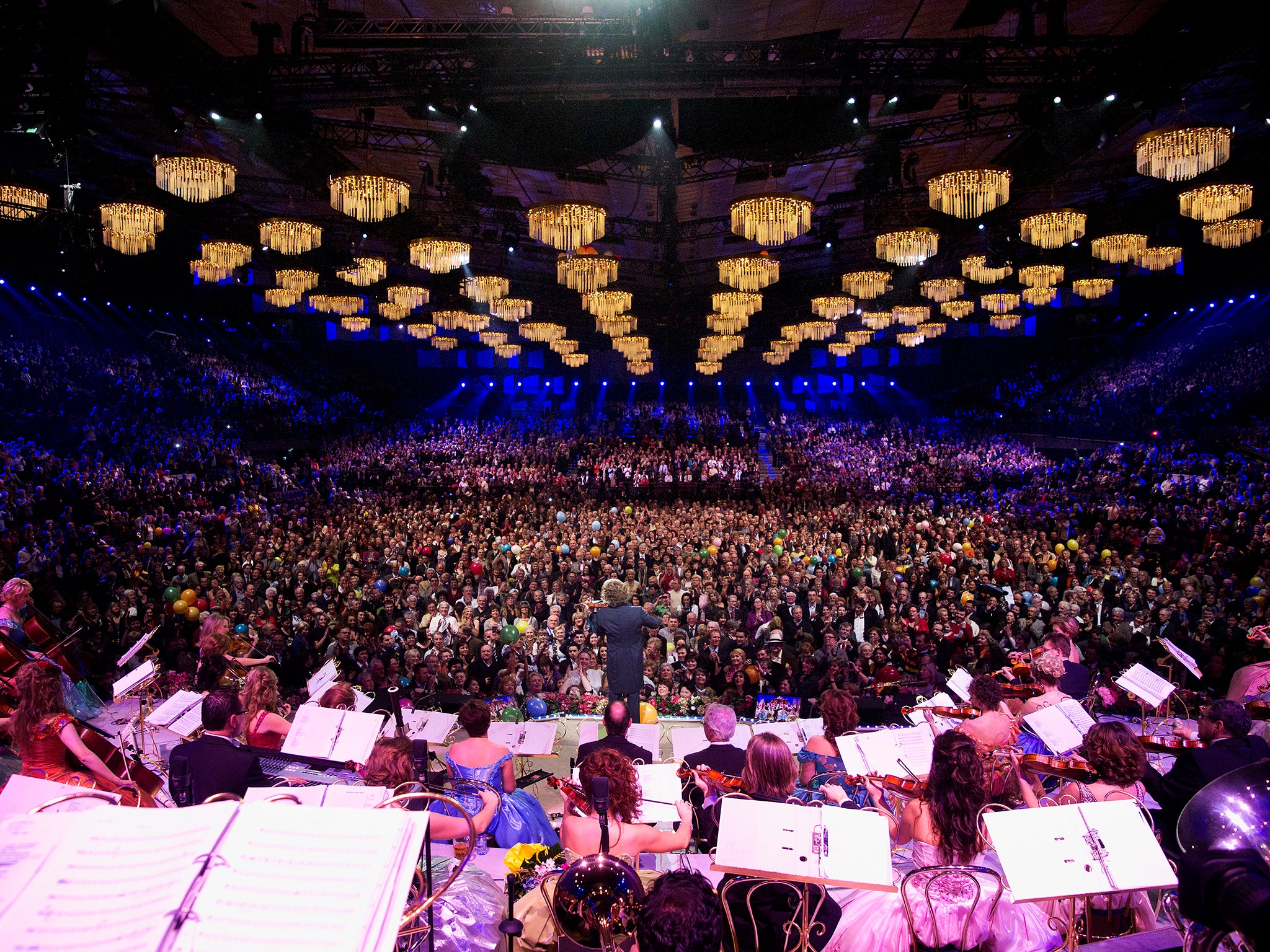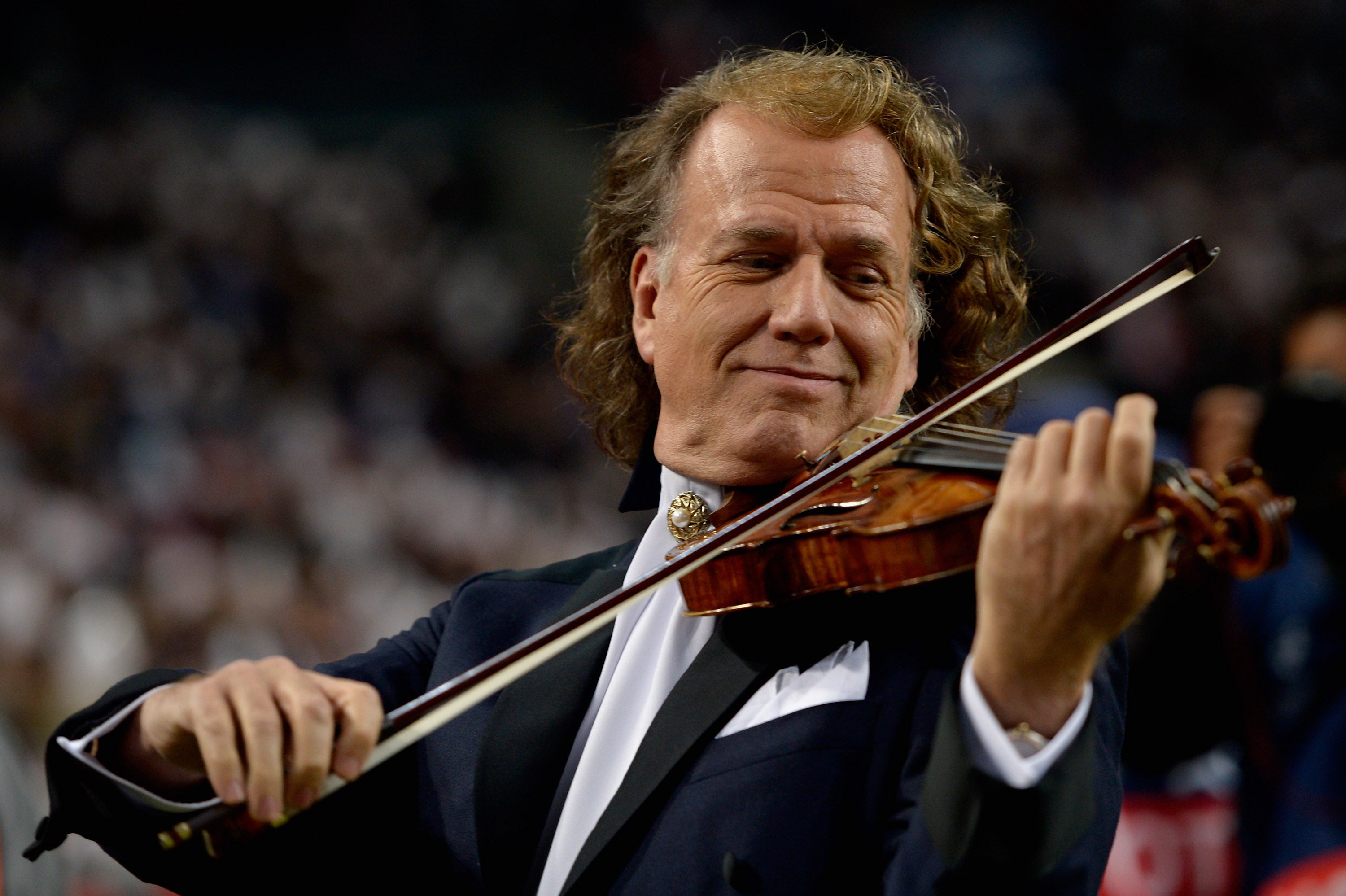Andre Rieu: How the Waltz King's concerts have inspired a cult following
Rieu's concerts prove that classical performers can engage with their audience without sacrificing their musical integrity

For many music lovers, André Rieu, the Dutch violinist and so-called modern Waltz King, is an irresistible attraction. He and his orchestra, performing light, tuneful classics and crossover – are not only about music, but also showbiz. They often top the classical recording charts. And they’re loved, loved, loved.
Except in hardcore classical music circles, that is. If you want to see a roomful of those administrators squirm, show them a Rieu performance and ask what the orchestral world might learn from his runaway success
That’s what happened at the trade fair and think-tank Classical:NEXT, held recently in Rotterdam, during a session exploring business models for orchestras, led by Claire Mera-Nelson, director of music at Trinity Laban Conservatoire of Music and Dance, and Mark Pemberton, director of the Association of British Orchestras. Still, nobody could help noticing one thing about Rieu and co: the audience. People of all ages having a great evening out, maybe dancing, singing along, cheering freely, visibly feeling welcome and happy.
Rieu, the charismatic focal point, talks to them, introduces his music and musicians, ceaselessly communicates with his public. And they keep coming back for more. Every aspect and every second of the show contributes to that experience.
The violinist and leader as cult personality is a notion that goes back at least to the 18th century; arguably, all Rieu has done is reboot it for the 21st. Why, then, the resistance? It’s that old chestnut – art versus entertainment. These terms have long seemed mutually exclusive. Must they always remain so? Could attendances be increased and orchestras’ incomes be lifted by taking a leaf or two out of Rieu’s modus operandi?
This doesn’t mean copying his style, but noting the way he achieves his aims from behind the scenes. “Rieu’s concerts are filmed with multiple cameras,” Mera-Nelson points out, “and most of them are on the audience. They then analyse the reactions in minute detail. If something doesn’t play well with the audience, they never repeat it.” Rieu’s success is all about setting out to understand his audience and making sure he gives them a good time.
The UK’s orchestras have become comparatively good at inventing innovative ways to attract different attendees and shake up concert formats; earning money is more vital for them than for those in European countries that still offer sizeable state subsidies. Yet even now you’ll notice some orchestral musicians slouch on to the platform apparently with little understanding that they are performers the minute they’re on stage. That’s just one basic mistake that Rieu’s players don’t make. For the crucial two-way energy between performers and audience to ignite, the very least the latter needs is a smile of acknowledgement from the former.

Moreover, the audience’s experience does not begin with the first note of music. It starts as soon as they arrive at the hall – and it’s then that you need a sense of occasion, a welcoming ambience, ease and efficiency of finding refreshments, cloakrooms and loos, comfortable seating both inside the hall and in the foyers, and much more besides. Rieu’s audiences wave flags, sport merchandise and participate by purchasing these – presumably at the event – thus acquiring a sort of personal stake in the goings-on. It might look like tat, but its effect goes oddly deeper. You might not want to wave a flag in a Mahler symphony, of course, but if the LSO were to start selling Simon Rattle mugs when he becomes music director, I’d happily take one home.
Instead, UK concert venues often exude the impersonal ambience of conference centres. Even regulars dislike this, so how off-putting must it be to newcomers? I don’t mind admitting that I attend some venues with a sinking heart on every occasion, however marvellous the performances they host. And art-focused orchestras and concert halls could address all these matters without sacrificing a jot of musical integrity.
The biggest names – Daniel Barenboim, Simon Rattle or Jonas Kaufmann – will always sell out. But such stars are few in number; the rest of the time, to create that great night out that keeps people coming back, matters beyond musical substance must contribute to making the audience feel welcome, happy and part of the event.
“The atmosphere, the welcome, the whole package is what we’re offering as ‘entertainment’,” Pemberton points out. “You have to focus on the audience. We so often focus on the art – yet we are so dependent on the people who go to hear us play! What are we doing for them? It’s time for marketing departments to look at the qualitative aspects of their experience.”
This issue is not going to go away. Today musicians have such intense competition for people’s leisure time that unless they understand what works – and do a bit more of it – punters may vote with their feet. Those wanting a head start must find new ways to know their audience, and know them well.
Join our commenting forum
Join thought-provoking conversations, follow other Independent readers and see their replies
Comments
Bookmark popover
Removed from bookmarks